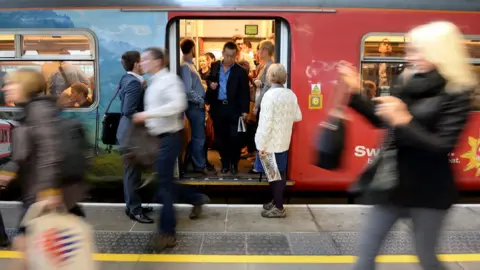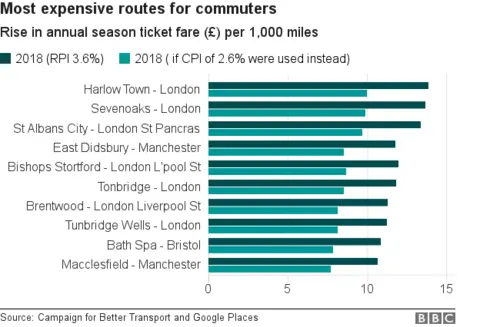Rail fares: Commuters to pay £100 more in 2018
 PA
PARail commuters will pay an extra £100 on average for annual season tickets when price changes come into force in the new year, analysis suggests.
The permitted increase equates to 3.6% and is taken from the Retail Prices Index inflation measure for July, which was announced by the Office of National Statistics on Tuesday.
Analysis of routes into six cities found the average annual season ticket would rise from £2,740 to £2,840.
Campaigners want the system reformed.
The rise of almost £100 is the average across 85 of the most commonly bought annual season tickets for commuters into London, Birmingham, Manchester, Liverpool, Leeds and Bristol.
It compares with an average rise in 2017 of £44 for the same tickets.

Commuters travelling between Harlow Town and London pay the most for annual season tickets per mile travelled. The current £3,496 annual fare will rise £126 in the new year.
It works out at an increased cost of £13.88 for every 1,000 miles commuted.
Campaigners argue the government should change from the Retail Prices Index (RPI) to the Consumer Prices Index (CPI) when regulating rail fares. CPI was was unchanged at 2.6% in July.
The CPI measure has gradually replaced the RPI over the past few years as the benchmark for changes to most government-controlled funding.
A spokeswoman for the Campaigner for Better Transport said: "Current projections show that the government's inflation figure will mean that rail fare rises are set to continue at a high rate for the next few years.
"Wages will have to go up by by the same rate to help commuters keep pace with rail fare increases. Instead, the government needs to retreat, freeze fares now, and use the Consumer Price Index figure for future increases."
The list of tickets was drawn up by the Campaign for Better Transport and our analysis looked at full time workers using an annual season ticket five days a week, minus weekends, holidays and bank holidays.
The government plans to use RPI to cap rail fare rises until at least 2020.
A Department for Transport spokesman said: "The government carefully monitors how rail fares and average earnings change, and keeps under review the way fare levels are calculated.
"We are investing in the biggest rail modernisation programme for over a century to improve services for passengers - providing faster and better trains with more seats.
"We have always fairly balanced the cost of this investment between the taxpayer and the passenger.
"On average, 97% of every £1 of a passenger's fare goes back into the railway."
